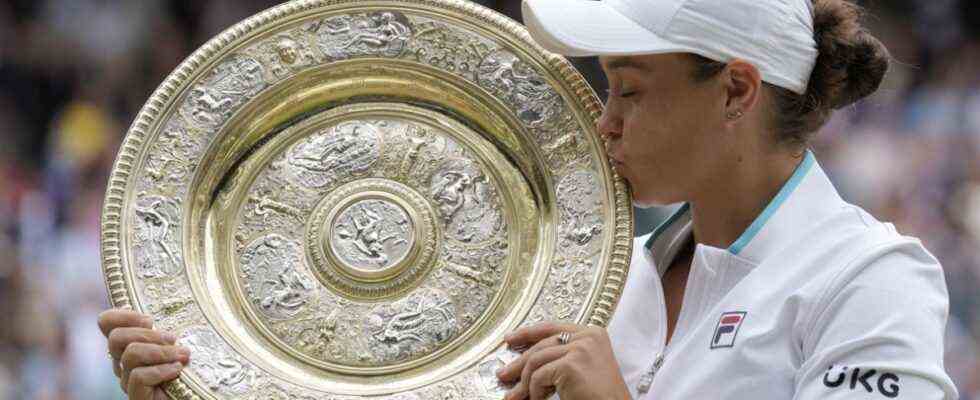Almost two hours had been played when Ashleigh Barty crouched on the tennis court, put her hands on her head and buried her face in her arms. You could tell by the slight tremor that she was crying. Sometimes it is the silent tears, not the expansive cheering poses, that give an indication of what success on this lawn, in front of 15,000 spectators, means.
“It took me a long time to even dare to put my dream into words and say that I wanted to win this unbelievable tournament at some point,” said Barty, when she won the heavy trophy shortly afterwards on Center Court to the applause of the audience , the Venus Rosewater Bowl. The last Australian whose name the silversmith engraved there was Evonne Goolagong Cawley. Now Barty, 25, has actually chosen herself to be the successor of her great role model, her mentor – 50 years after her first Wimbledon victory. A look into her incredulous eyes after the 6: 3, 6: 7 (4), 6: 3 against the Czech Karolina Pliskova gave an idea of what this anniversary triumph was worth to her.
It could hardly have been surprising if her hands were shaking that Saturday afternoon: In the final, her first final at Wimbledon, Barty wore not only a dress on his body, the cut of which was reminiscent of the white dress of her idol in the summer of 1971. She also carries in her heart the bond with the indigenous roots of Goolagong, who come from an Aboriginal family. “Evonne is such an important person in my life,” she said. “She paved the way and set an example for indigenous young people that you can believe in your dreams. And she showed me that too.” She is proud and happy to have a friend in Goolagong Cawley, a consultant who is always “only a phone call away”.
Evonne Goolagong Cawley at Wimbledon in 1971.
(Photo: United Archives / Imago)
Not only did she take the burden on the lawn of not disappointing her idol, who had even won Wimbledon twice; Goolagong Cawley triumphed in 1971 when she was 19 and again in 1980 when she was already a mother. Barty had also weighed the burden of the expectation of an entire continent on her rather narrow shoulders. She may be number one in the tennis world rankings – but at just 1.66 meters she is not one of the heavyweights of her craft. “Australia has such a rich sports history,” she said. After 41 years of waiting, she was happy to be able to add a small chapter. “I hope that I can now also show a way for boys and girls.”
Karolina Pliskova has to wait for her first triumph in a Grand Slam tournament
A victory as an inspiration for many – especially since her physical condition was not the best: At the French Open a month ago she had to give up prematurely due to a hip injury and then no longer competed; The team left her in the dark about the doctors’ diagnosis, she said, but the prognosis was anything but favorable.
Little of all these burdens and hardships could be seen on the square. Barty literally sprinted into this match against Pliskova, who was also a novice in the Wimbledon final. They secured 14 points in a row and until the 4-0 everything pointed to a final in record time. Pliskova has one of the best serves on the tour, she had managed 54 aces up to the semifinals, but Barty initially returned with a certainty that cotton balls were flying towards her. After half an hour, the first set was over.
Then Pliskova, 29, proved why she has been one of the best and most consistent players on the tennis tour for years – many consider her the most brilliant who never won a Grand Slam tournament. Only once before was she in a Grand Slam final, at the US Open 2016, when she lost to Angelique Kerber. For several months she has been trained by the successful German coach Sascha Bajin, who had led the Japanese Naomi Osaka to two Grand Slam victories, and was now finally hoping for the trophy that she had previously been denied. But she was again without success, despite powerful forehand strokes, with which she put Barty under increasing pressure. She won the second set in the tie-break. In the third run she gave Barty another early break with a volley error. The Australians saved the lead after 1:55 hours.
Pliskova also shed tears after the match. “I loved every minute of playing on this course,” she said. She got no further. “I never cry, and now …” She will keep trying. Barty, on the other hand, who had already won the French Open in 2019, appeared to be relieved of a burden. For Australians, she said, when all tears were dry, this tournament meant so much: “After all, this is the place where tennis was born, as it were.” She experienced her toughest and most beautiful hours here: “I can say that I’m a pretty happy girl.”

